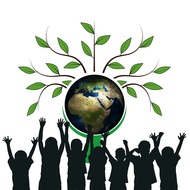Zombie Guacamole (5th)
(View Complete Item Description)Zombie Guacamole is an upper elementary curricular program created by EarthGen. For this unit, we offer professional development training and assistance with implementation. If you are interested in implementing this program at your school or district, please let us know! Please contact info@earthgenwa.org for more information. In Zombie Guacamole, students build an evidence-based explanation of why a bowl of guacamole was found at the bottom of a 25-year-old landfill, still fresh! The focus of this program is decomposition: what is required for it to occur, its importance to ecosystems, and how waste systems are linked to the health of people and the environment. Students develop explanatory models to describe the movement of matter in an ecosystem and work in groups to manipulateconditions for decomposition in an investigation. Beyond that, students also build knowledge of natural and human-made systems of food production and waste management to inform action in their school community to protect Earth’s resources and environment. Through Zombie Guacamole, students can combine scientific understanding, environmental consciousness, and action to become leaders for a more just and sustainable future.
Material Type: Activity/Lab, Lesson, Unit of Study









